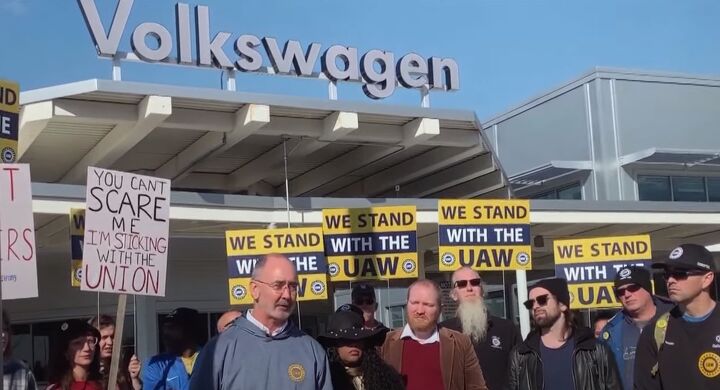Southern Unionization Remains An Uphill Battle As Governors Caution Against UAW

With the United Automobile, Aerospace and Agricultural Implement Workers of America International Union (UAW) seeking to expand in the Southern United States, Republican governors have started to condemn the action on the grounds that it would be detrimental to the economy. Governors in Alabama, Georgia, Mississippi, South Carolina, Tennessee and Texas released a joint statement against the UAW shortly before Volkswagen workers in Chattanooga, Tennessee, were supposed to begin voting on whether or not to unionize.
The situation at the VW plant is part of a larger move announced by UAW President Shawn Fain in 2023, following the sweetheart deal the union negotiated with domestic manufacturers. Fain wants to target just about every automaker operating within the United States without union representation, most of which are located below the Mason–Dixon line, and has launched a massive campaign to bolster UAW membership.
Southern governors confessed that such a move could indeed raise the hourly pay of some workers. However, they’ve likewise alleged that the long-term impacts would be detrimental to the economy and cited the sweeping layoffs endured by unionized factories in recent years.
From the joint statement:
“We the governors of Alabama, Georgia, Mississippi, South Carolina, Tennessee and Texas are highly concerned about the unionization campaign driven by misinformation and scare tactics that the UAW has brought into our states. As governors, we have a responsibility to our constituents to speak up when we see special interests looking to come into our state and threaten our jobs and the values we live by.
“The reality is companies have choices when it comes to where to invest and bring jobs and opportunity. We have worked tirelessly on behalf of our constituents to bring good-paying jobs to our states. These jobs have become part of the fabric of the automotive manufacturing industry. Unionization would certainly put our states’ jobs in jeopardy – in fact, in this year already, all of the UAW automakers have announced layoffs. In America, we respect our workforce and we do not need to pay a third party to tell us who can pick up a box or flip a switch. No one wants to hear this, but it’s the ugly reality. We’ve seen it play out this way every single time a foreign automaker plant has been unionized; not one of those plants remains in operation. And we are seeing it in the fallout of the Detroit Three strike with those automakers rethinking investments and cutting jobs. Putting businesses in our states in that position is the last thing we want to do.
“The experience in our states is when employees have a direct relationship with their employers, that makes for a more positive working environment. They can advocate for themselves and what is important to them without outside influence. The UAW has come in making big promises to our constituents that they can’t deliver on. And we have serious reservations that the UAW leadership can represent our values. They proudly call themselves democratic socialists and seem more focused on helping President Biden get reelected than on the autoworker jobs being cut at plants they already represent.
There are also concerns that the presence of the UAW would shift the political landscape in the South, something that is clearly highlighted in the governors’ collective statement.
While the Southern United States had typically been a massive voting block for the Democrats from before the Civil War through the 1960s, many areas have become deeply Republican. We’ve seen the inverse happen in some Northern states, with many ready to point to unionization as the cause.
Michigan is probably the best example of this. From 1856 to 1928, the state could reliably be counted on to vote Republican. But things changed following the Great Depression and Second World War. Troubled times resulted in Michigan becoming a swing state for several decades, ending in 1972 when it became majority Republican once again. While it can once again be considered a swing state in the modern context, it’s almost exclusively voted Blue when selecting senators and presidents since 1992. That has been attributed primarily to Michigan’s urban areas and high levels of unionization — with the UAW being one of the largest.
While your author is less inclined to believe any singular factor decides an election, it’s more-or-less a certainty that AFL-CIO member unions trend toward backing the Democrats. The UAW has likewise shunned Republicans for most of its existence. Despite UAW President Shawn Fain originally stating the union wanted nothing to do with either party during the 2023 contract negotiations, he eventually came out to support Joe Biden wholeheartedly.
But presuming this would be sufficient to secure the votes of union members is another matter. While it is true that the UAW does strongly encourage its members to back the leadership's chosen candidates, there has been a clear fracture between unionized labor and the top brass in recent years. Surveys taken since 2016 have shown a strong tendency for line workers to break tradition and vote Republican.
The rest of the governors’ statement overlaps with the concerns outlined at the start of this article. One of the primary reasons Southern states have seen such a dramatic increase in automotive jobs is down to automakers seeing it as financially prudent. A lack of union influence made Southern regions more appealing to foreign automakers. Wages were a little lower and the state’s were willing to offer appetizing deals to ensure companies built their factories within their borders.
“We want to keep good paying jobs and continue to grow the American auto manufacturing sector here,” reads the statement. “A successful unionization drive will stop this growth in its tracks, to the detriment of American workers.”
General Motors employees enjoyed their peak in 1995, with an estimated 754,000 employees. In 2023, that number had declined to just 163,000 employees. Ford saw a similar collapse in employment numbers, albeit later on. Despite holding onto roughly 350,000 employees through 2002, it’s now sitting on about 177,000. Meanwhile, Stellantis has seen rolling layoffs as the ownership of its many brands has continued changing hands.
However, not all of the above can be directly attributed to unionization. Automation, electrification and the offshoring of American jobs played a massive role, as did more direct competition from foreign automakers. We also saw companies take it on the chin during the 2008 financial crisis — including Ford, which managed to prepare itself better than others. But the assumption is that UAW involvement had discouraged all automakers from investing heavily into states with a strong union presence and that this ultimately resulted in transitioning the Midwest into what is now colloquially known as the Rust Belt.
Today, we’re seeing buyout offers and layoffs of salaried and hourly workers following the ratified UAW contracts. Yet the lingering question is whether or not the union caused these things to happen or made for a convenient excuse. Automakers have cited the UAW contract as a direct reason for some of the layoffs incurred this year. But that doesn’t mean it was the only factor.
As the vote to unionize the Volkswagen plant in Tennessee happens today, we should see how things shake out by next week.
[Image: UAW]
Become a TTAC insider. Get the latest news, features, TTAC takes, and everything else that gets to the truth about cars first by subscribing to our newsletter.

A staunch consumer advocate tracking industry trends and regulation. Before joining TTAC, Matt spent a decade working for marketing and research firms based in NYC. Clients included several of the world’s largest automakers, global tire brands, and aftermarket part suppliers. Dissatisfied with the corporate world and resentful of having to wear suits everyday, he pivoted to writing about cars. Since then, that man has become an ardent supporter of the right-to-repair movement, been interviewed on the auto industry by national radio broadcasts, driven more rental cars than anyone ever should, participated in amateur rallying events, and received the requisite minimum training as sanctioned by the SCCA. Handy with a wrench, Matt grew up surrounded by Detroit auto workers and managed to get a pizza delivery job before he was legally eligible. He later found himself driving box trucks through Manhattan, guaranteeing future sympathy for actual truckers. He continues to conduct research pertaining to the automotive sector as an independent contractor and has since moved back to his native Michigan, closer to where the cars are born. A contrarian, Matt claims to prefer understeer — stating that front and all-wheel drive vehicles cater best to his driving style.
More by Matt Posky
Latest Car Reviews
Read moreLatest Product Reviews
Read moreRecent Comments
- 28-Cars-Later I'm not sure when it was shot, but I noticed most shots featuring a Ford are pushing the BEV models which haven't sold well and financially kicked the wind out of them. is it possible they still don't get it in Dearborn, despite statements made about hybrids etc.?
- ToolGuy I watched the video. Not sure those are real people.
- ToolGuy "This car does mean a lot to me, so I care more about it going to a good home than I do about the final sale price."• This is exactly what my new vehicle dealership says.
- Redapple2 4 Keys to a Safe, Modern, Prosperous Society1 Cheap Energy2 Meritocracy. The best person gets the job. Regardless.3 Free Speech. Fair and strong press.4 Law and Order. Do a crime. Get punished.One large group is damaging the above 4. The other party holds them as key. You are Iran or Zimbabwe without them.
- Alan Where's Earnest? TX? NM? AR? Must be a new Tesla plant the Earnest plant.


































Comments
Join the conversation
Unions and ownership need to work towards the common good together. Shawn Fain is a clown who would love to drive the companies out of business (or offshored) just to claim victory.
Although I'm not much of a UAW guy, anything that gets the red states to at least purple status is fine by me.